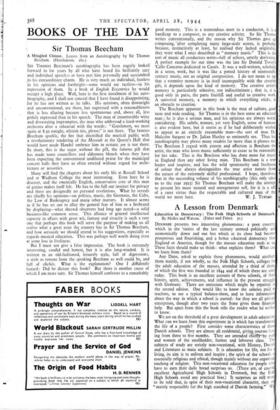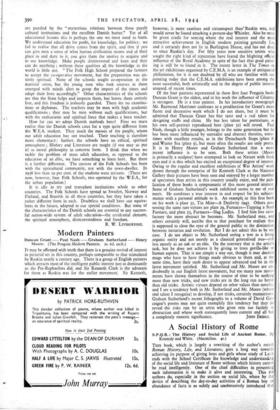Education in Democracy: The Fmk High Schools of Denmark , .
By Moller and Watson. (Faber and Faber. 5s.)
A Lesson from Denmark
Education in Democracy: The Fmk High Schools of Denmark, . By Moller and Watson. (Faber and Faber. 5s.) DENMARK presents two interesting phenomena: a poor. country, which in the 'sixties of the last century seemed .politically and economically down and out but which at its close' had become proiperous and flourishing, and a better educated democracy than England or America, though for the masses education ends at 14. These facts should make us think : what explains them? What can we learn from them?
Any Dane, asked to explain these phenomena, would attribute them mainly, if not wholly, to the Folk High Schools, colleges for the adult education of the masses, attended by a third of them. of which the first was founded in 1844 and of which there are sixtv today. This book is an excellent account of these schools, of their history, spirit, achievements, and influence in the present struggle with Germany. There are omissions which might be repaired it the second edition. One would like to know the salaries paid h teachers, to see a typical balance-sheet, and to have informatio about the way in which a school is started: for they are all private enterprises, though after two years the State gives them financial help. But apart from this the book tells the reader what he wishes to know.
We are on the threshold of a great development in adult oducati What can we learn from this experiment in it which has transforme the life of a people? First consider some characteristics of then Danish schools. They are almost all residential, givi courses last ing from three to five months. They are attended chiar-by and women of the smallholder, farmer and labourer class. Th subjects of study are strictly non-vocational, with History, Danis and Literature as main subjects. It is education for life, not for living, its aim is to enliven and inspire ; the spirit of the schools I essentially religious and ethical, though mainly without any organic teaching of religion. This' non-vocational education for people wh have to earn their daily bread surprises us. (There are, of cour excellent Agricultural High Schools in Denmark, btsi. the Fo High Schools avoid any practical bias.) It surprises us still mor to be told that, in spite of their non-vocational character they " mainly responsible foil the high standard of Danish fanning." are puziled by the " mysterious relations between these purely cultural institutions and the excellent Danish butter." Yet of all educational lessons this is perhaps the one we most need to learn. We understand education for profit, for knowledge, for politics: we fail to realise that all drive comes from the spirit, and that if you can give men a sense of what human civilisation means and of their place in and duty- to it, you give them the motive to acquire and to use knowledge. Make people disinterested and keen and they can do anything ; without these qualities all the knowledge in the world is little use. "The Folk High School prepared the farmers to accept the co-operative movement, but the preparation was en- tirely spiritual. None of the schools taught co-operation in the material sense, but the young men who took courses at them emerged with minds alert to grasp the import of the times and adapt their lives accordingly." Other characteristics of the schools are that the State helps and inspects them, but leaves them entirely free, and this freedom is jealously guarded. There are no examina- tions or diplomas. The teachers may be men with high academic qualifications ; they may be men without such qualifications, but with the enthusiasm and spiritual force that makes a born teacher.
How far can we adopt Danish methods here? First we must realise that the Danish schools cater for a type quite different from the W.E.A. student. They reach the masses of the people, whom our adult education has not touched. Their teaching is therefore more elementary : further, the schools have an ethical, spiritual atmosphere ; Hisfory and Literature arc taught (if one may so put it) as moral philosophy in concrete form. I think that when we tackle the problem of mass adult education, as opposed to the education of an-elite, we have something to learn here. But there is a further difference. The success of the Folk Schools has been with the agricultural community, not with the town-dweller. In 1938 less than so per cent. of the students were artisans. (There are now, however, four Folk Schools, two operated by the W.E.A., for the urban population.)
It is idle to try and transplant institutions whole to other countries. The Folk Schools have spread to Sweden, Norway and Finland, and flourish in all three countries, but they have taken a rather different form in each. Doubtless we shall have our equiva- lents in the future, adapted to our special conditions. But some of the characteristics of the Danish schools are essential to any success- ful nation-wide system of adult education—the residential element, the spiritual atmosphere, disinterestedness and freedom..
R. W. LIVINGSTONE.



























 Previous page
Previous page